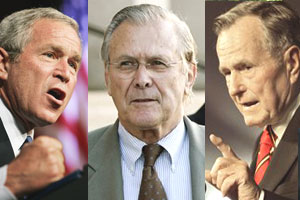
"I don't want to, Daddy. I don't like it."
Writing in The Washington Post, Peter Baker and Thomas E. Ricks take on the role of amateur psychologists.
They've decided that Donald Rumsfeld's resignation and his replacement Robert M. Gates indicate that President Bush is running to Daddy for help.
This sort analysis has been a favorite pastime of the Left since W. first went out on the presidential campaign trail.
Nine months after invading Iraq, President Bush told an interviewer he did not turn to his father for strength. "There is a higher father that I appeal to," he said. Nearly three years later, Bush may be appealing to his earthly father as well. Or at least his people.
With the war in Iraq going badly and Congress captured by the opposition, a commander in chief who has labored to demonstrate independence from his presidential father is now seeking help from some key veterans of George H.W. Bush's team to salvage the remainder of his own administration.
The suggestion is that W. tried to be president without help from Daddy, but he failed.
So, Daddy is stepping in to bail him out.
How lame!
Why is so much made of the father/son thing?
Lefties just can't let that go.
...A day after suffering a "thumping" in midterm elections, the president ousted Defense Secretary Donald H. Rumsfeld, a longtime rival of his father's, and replaced him with Robert M. Gates, his father's CIA director. And the president has invested great hope in James A. Baker III, his father's friend and secretary of state, to come up with a plan to correct the course in Iraq in a blue-ribbon commission report due as soon as next month.
"It certainly looks as if there is the handprint of Bush 41," said retired Army Col. F.W. "Bill" Smullen, a close aide to former secretary of state Colin L. Powell, using the nickname for the former president.
The Post always manages to come up with a comment from someone close to Colin Powell.
Have you noticed that?
...The relationship between the 41st and 43rd presidents has been a source of running commentary and speculation for six years. The son has often seemed to go out of his way to identify himself with Ronald Reagan rather than his father, and his personnel and policy choices often seemed at odds with the philosophy of the earlier Bush administration.
The speculation about the psychodynamics of Bush 41 and Bush 43's relationship is so amusing.
Why is it amusing?
BECAUSE IT'S GOOFY SPECULATION.
If the father was the patriarch of the realist school of foreign policy that aims to manage a combustible international order, the son brought to power neoconservatives who want to remake the world and spread democracy. The president has given speech after speech assailing past administrations for accepting tyranny in the Middle East in the belief that stability equaled security, a thesis that he says exploded tragically on Sept. 11, 2001.
The elder Bush was reported to have been skeptical of the way the younger Bush launched the war in Iraq in 2003 -- reports that were fueled in part by public comments before the invasion by Baker and Brent Scowcroft, the former president's national security adviser and close friend. Scowcroft later broke entirely with the current administration and was eased off the president's foreign intelligence advisory board.
Both Bushes get angry, however, at public suggestions of a rift, and some close to them say the Washington chattering class assumes far more than it knows. In this view, comments such as the "higher father" remark, made to journalist Bob Woodward, have been over-interpreted and exaggerated. Many people who serve in the current administration also served in the father's, including Vice President Cheney, Secretary of State Condoleezza Rice and national security adviser Stephen J. Hadley, belying the notion of competing camps.
Even if the theory about Bush family tension is overwrought, though, the existence of some type of rival factions has been a constant subtext of the current administration. The turn to representatives of the old Republican establishment such as Baker and Gates, whether it has anything to do with paternal relations or not, has sent a signal that Washington perceives as a bid to bring more pragmatism to policymaking.
Ooooooh. "Subtext."
How Ophrah-esque!
...[Tom Donnelly, a scholar at the Center for Strategic and International Studies] said, the question remains what the president is really thinking. "Bush's mind works differently from the normal political mind. He seems to be motivated by faith and ideals and willing to take risks politically. Maybe these Baker guys can talk him off the ledge, but nobody's done it yet."
In effect, The Post is saying that W. has been a bad boy and made a big mess in Iraq.
It's so out of control that Daddy has to step in, coming to the rescue.
The Post isn't satisfied that the Republicans took a "thumpin'" on Tuesday. Now, it has to criticize President Bush as running to Daddy when the going gets tough.
Even though W. has enlisted the help of some of Bush 41's buddies, he hasn't been talked off the ledge yet, as Tom Donnelly puts it.
Apparently, the frat boy Bush 43 hasn't been convinced to grow up by Daddy Bush 41. "That boy ain't right."
While it's fair to point out the connections that Robert Gates has with Bush 41, I think it's positively goofy to frame the war in Iraq as a father/son struggle.
No comments:
Post a Comment